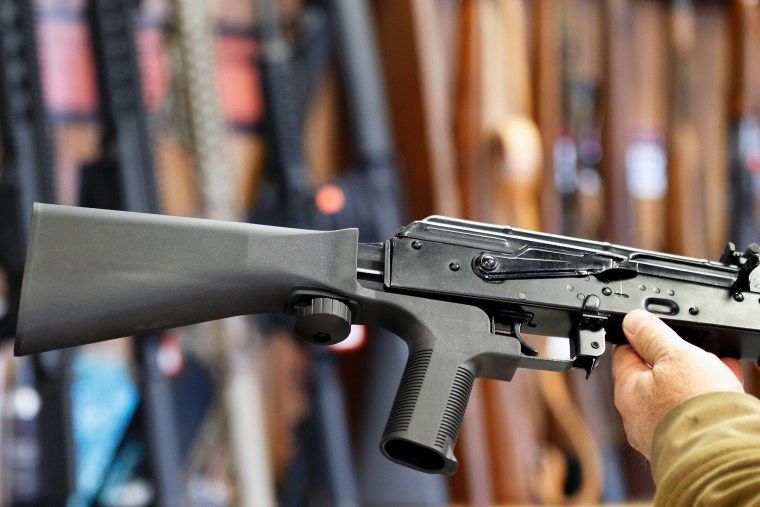WASHINGTON — The Supreme Court on Friday stepped into a new gun rights battle by agreeing to weigh whether a Trump-era ban on so-called bump stocks, which allow semi-automatic rifles to fire more quickly, is lawful.

The justices were asked by both the Biden administration and gun rights activists to take up the issue, with lower courts reaching differing conclusions on it.
The case concerns Texas-based gun owner and licensed dealer Michael Cargill, who owned two bump stocks before the ban went into effect and later surrendered them to the government. He sued, claiming that the Bureau of Alcohol, Tobacco, Firearms and Explosives lacked the legal authority to implement the prohibition.
The conservative-majority high court issued a major ruling in June 2022 that expanded gun rights, although the legal issues arising from the bump stocks ban are different.
Bump stocks are accessories for semi-automatic rifles, such as the popular AR-15-style weapons. They use the recoil energy of a trigger pull to enable the user to fire up to hundreds of rounds a minute.
President Donald Trump’s administration imposed the ban after the mass shooting in Las Vegas in 2017, when Stephen Paddock used bump stocks to open fire on a country music festival, initially killing 58 people. Paddock died by suicide as he was about to be apprehended.
The ban was a rare example of a Republican administration taking action on gun control.
"Guns equipped with bump stocks can cause massive devastation. These are devices that fire like machine guns and kill like machine guns, so it’s a no-brainer that they should be regulated like machine guns,” said Nick Suplina, senior vice president for law and policy at Everytown for Gun Safety, a gun control group.
The policy went into effect in 2019 after the Supreme Court declined to block it. Since then, the already conservative court has tilted further to the right, with conservative Justice Amy Coney Barrett, a Trump appointee, replacing liberal Justice Ruth Bader Ginsburg, who died in 2020.
The court, with its new 6-3 conservative majority, ruled for the first time in the June 2022 gun rights decision that the right to bear arms under the Constitution’s Second Amendment protects an individual right to carry a handgun outside the home. The ruling was the most significant expansion of gun rights since the Supreme Court held in 2008 that there was an individual right to bear arms in self-defense at home.
Next week, the justices will hear a follow-up case testing the scope of its 2022 ruling on whether people accused of domestic violence have a right to own firearms.
The bump stocks challenge does not implicate the scope of the right to bear arms. The challengers argue that the government does not have authority to ban bump stocks under the National Firearms Act, a law enacted in 1934 to regulate machine guns.
The 1968 Gun Control Act expanded the definition of "machine gun" to include accessories “for use in converting a weapon” into a machine gun, and the ATF concluded that bump stocks meet that definition.
Those challenging the ban said the legal definition of machine gun has been distorted beyond recognition and argue that courts should not defer to the federal agency’s interpretation.
Richard Samp, a lawyer with the New Civil Liberties Alliance, a legal group representing Cargill, said, “ATF for many years recognized that bump-stock-equipped semi-automatic weapons are not ‘machineguns.’ Its sudden reversal can only be explained as a decision to allow political expediency to trump the rule of law."
The Supreme Court in October 2022 turned away two earlier cases brought by gun rights advocates challenging the bump stocks ban.
Now the legal landscape is different, with both the New Orleans-based 5th U.S. Circuit Court of Appeals and the Cincinnati-based 6th U.S. Circuit Court of Appeals ruling that the ban was unlawful.
The Biden administration appealed in both cases, while gun rights advocates asked the justices to hear their appeal from a ruling by the U.S. Court of Appeals for the District of Columbia Circuit that upheld the ban.
The court on Friday also took up a second gun rights-related case on the National Rifle Association’s claim that a New York state official’s alleged role in urging companies to end ties with the gun rights group constituted unlawful coercion.
